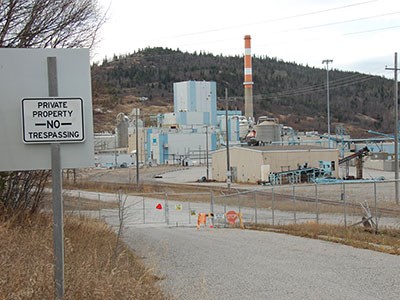All signs look positive for a U.S. brownfield redeveloper to take over an abandoned pulp mill in northwestern Ontario.
The sale of the former Marathon Pulp mill from Tembec to Illinois-based Green Investment Group Inc. (GIGI) was finally signed off by the Ontario Ministry of Environment (MOE) in late May.
The new American owners have been given detailed instructions from the MOE to begin their remediation at the contaminated waterfront site.
Tembec sold the property late last fall to GIGI, which specializes in taking abandoned and heavily contaminated industrial sites across North America and cleaning them up to attract small companies engaged in green business manufacturing such as biofuels and bioenergy.
The Marathon Pulp property has been an environmental hotspot on the north shore of Lake Superior ever since the mill permanently stopped production in 2009.
The sale price isn't known but the ministry's approval of the agreement does come with conditions according to MOE spokeswoman Lisa Brygidyr.
Tembec, a co-owner of the mill which went bankrupt, had disputed a provincial order requiring the company to be in care and control of the property.
After a drawn-out legal fight, a 2011 settlement agreement signed by Tembec put the forestry giant in charge of all known and unknown environmental issues on the site.
Under the new arrangement, GIGI is now bound by the environmental requirements of that settlement but opnly for the current environmental issues, but Tembec remains on the hook for any problems that may arise in the future.
“It's polluter pay,” said Brygidyr. Similar to a mine closure plan, $6.8 million has been set aside by the two companies as financial assurance for the cleanup: $4.8 million from Tembec and $2 million by GIGI.
The MOE has now ordered the American company to close and cap an open landfill containing non-hazardous waste, remove a bark pile and waste wood chips, and decommission an industrial sewage works that caused a number of chemical spills into Marathon's harbour between 2009 and 2011.
GIGI must also prepare a demolition plan of the mill buildings unless they plan to sell them to incoming tenants for commercial purposes.
GIGI president Ray Stillwell was not available for comment. A company spokeswoman said there was still a pending deal with Tembec to be finalized.
“This is really great news for the town of Marathon,” said Brygidyr. “It supports the redevelopment of the former mill property leading toward some economic opportunities for the community instead of an abandoned industrial property but it also allows that the ministry can take action and there is a responsible party there to ensure there’s management for long-term environmental protection.”
Bob Hancherow, economic development officer for the town of 3,300, also welcomed the resolution of the mill issue.
With the sale agreement approved, he said the focus can now shift for GIGI toward finding the right tenants for the site.
“This thing’s dragged on for so long and now it’s like a door just opened and what are the possibilities?”
It’s not been confidential news that Protocol Energy of Toronto, a wood pellet manufacturer, is one potential tenant.
Hancherow said he's been fielding calls from demolition companies wanting to submit bids as well as inquiries from companies in the service sector, forestry, mining and energy-related fields. He’s funneling those contacts over to GIGI.
“These folks are very professional and they’re open to any ideas.”
He said most of the company’s attention has been devoted to surveying the site to see if the main buildings have to be razed.
“We’re a long way from ink drawings and specific contracts.”
Besides having access to the Trans-Canada Highway and a rail connection, one of the mill property’s big advantages is its commercial dock.
“The reason Marathon and that pulp mill were here for over 50 years is because of that harbour,” said Hancherow.
The arrival of Green Investment Group is not the only good news in Marathon. Stillwater Mining of Montana is working through an extensive environmental review for its Marathon PGM open pit project north of town. If the mine is greenlighted there are potentially 365 direct jobs.
Overall, the economy is looking up on the Superior’s north shore with Rentech embarking on a pellet mill in Wawa, Frank Dottori reviving the former White River sawmill and India’s Aditya Birla Group investing in the Terrace Bay mill to make dissolving pulp used for rayon.
Marathon is also one of the host communities for a new provincially-created local forest management corporation.
“Forestry is not dead,” said Hancherow. “We all went through the perfect storm in Northern Ontario but I see it coming back and coming back strong.”




